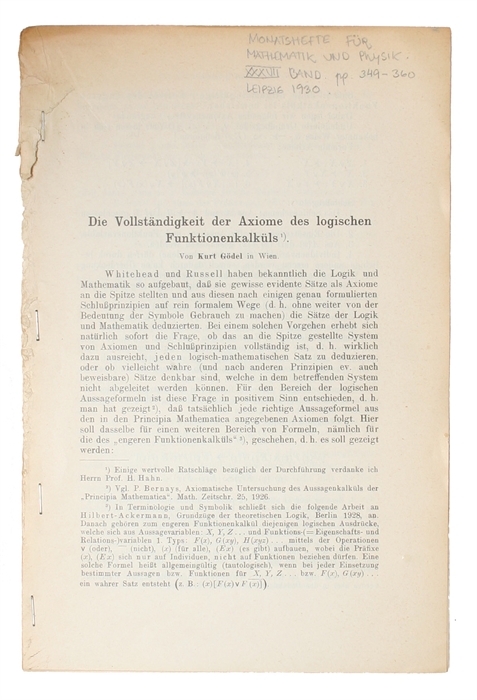THE COMPACTNESS THEOREM
GÖDEL, KURT.
Die Vollständigkeit der Axiome des logischen Funktionskalküls. [In: Monatshefte für Mathematik und Physik, XXXVII. Band].
[Leipzig, 1930).
8vo. Stapled extract. Some flossing to inner margin, probably from when extracted, far from affecting text. Handwritten indication of the journal, from which it is extracted, in pencil, on top of first page. Pp. (349) - 360.
The scarce first printing of this seminal paper, in which Gödel, the greatest logician since Aristotle, proves for the first time the compactness theorem, which is of the greatest importance to the development of model theory, as it provides a useful method for constructing models of any set of sentences that is finitely consistent. The compactness theorem is used by Gödel to derive a generalization of the completeness theorem.
The present highly important and influential paper constitutes a revised and shortened version of Gödel's doctorial dissertation, published the same year, in which he showed that every valid formula of first-order logic is provable and, moreover that each axiom of first-order logic is independent (the first of which is referred to as Gödel's completeness theorem). In this journal version he, in addition to that proved in the dissertation, also proved his highly influential compactness theorem (which states that a set of first-order sentences has a model if and only if every finite subset of it has a model).
"G settled the [problem] of completeness (positively) in the summer and wrote up the result as his dissertation, which was finished by July. A revised version was received by the editor of "Monatshefte" on 22 October and published 1930; a main addition was what is now known as "Compactness theorem". G received his doctoral degree on 6 February 1930. He presented his result in Menger's colloquium on 14 May and in Königsberg on 6 September 1930." (Wang, Reflections on Kurt Gödel).
"The Compactness Theorem was extended to the case of uncountable vocabularies by Maltsev in 1936, from which the Upward Löwenheim-Skolem theorem immediately follows. The Compactness Theorem would become one of the main tools in the then fledgling subject of model theory." (SEP).
From the library of the highly important Danish logician and philosopher Jørgen Jørgensen (1894-1969), who was an active collaborator with the logical positivists from the Vienna Circle. After Hans Hahn's death he became editor of the series of the Vienna Circle, the "Einheitswissenchaft" ("Unified Science"), and later he collaborated on the International Encyclopedia, to which he contributed with the essay "The Development of Logical Empiricism", 1951. Jørgensen is also widely recognized for his three volume work "Treatise of Formal Logic; Its Evolution and Main Branches, with its Relations to Mathematics and Philosophy", 1931.
Apart from the paramount importance of the paper, it is also of the utmost rarity, as evidenced by the fact that it is neither present in the collection of Honeyman, Barchas, Haskell Norman, nor Hook & Norman: Origins of Cyberspace, and furthermore, the paper has not been up for sale on any of the major auction houses for at least the last 50 years.
Order-nr.: 39227

